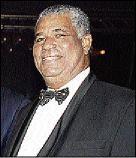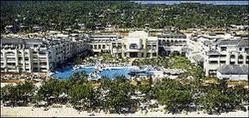Linda Hutchinson-Jafar, Business Writer

John Lynch, chairman of the Jamaica Tourist Board, says new charters are needed.
Jamaica has no problem with availability of hotel accommodation. Its challenge is getting additional airlift to fill the rooms that have been growing as a result of big investment in hotel development, particularly by the Spanish, in the past few years.
"We have a situation now with new rooms coming on (the market). People can't swim to Jamaica, so our first task and we are moving aggressively on it, is to get more people to fly, we need more air-lift," says John Lynch, chairman of the Jamaica Tourist Board.
"The Government was able to help us to put together a proper advertising budget for the winter. We're now on national television in America, we are marketing our way out of problems, we're trying to deal with the airlift and we're moving along."
In 2006, the most current data compiled revealed, Jamaica's room stock rose by more than 500 rooms to 26,653, of which 110 rooms were newly built.
Airlifts that year rose by 8.4 per cent to 5.1 million passengers.
Since then Spanish investors have placed new rooms on the market, notably phase one of Iberostar in Montego Bay which became operational in late 2007.
Lynch told the Financial Gleaner that talks have been held with a number of airlines and tour operators particularly out of Europe, with another trip to the continent scheduled before the end of the month to continue discussions.
During this month's Caribbean Hotel Association Marketplace event in The Bahamas, Tourism Minister Edmund Bartlett and his delegation also held a series of meetings with several international experts about finding solutions and opportunities for Jamaica.
One was an initial encounter with a 'premium-class airline about providing service to Jamaica from London and attracting a new calibre of luxury visitor to the island', according to an update from the Jamaica Tourist Board.
Back-to-back investment
Lynch said because of back-to-back investment on the island, more rooms will be available shortly.
These include the 940-room new Palladium opening in May. Beaver Star is due to open shortly while another Riu hotel is under construction,
"So we have no problem with rooms, but our problem is getting the air seats to fill the rooms," he added.
Basil Smith, director of tourism, and chief executive of the JTB, said Jamaica has been attracting massive hotel investments largely out of Spain over the large five years with an average of 1,000 rooms constructed on an annual basis.
"This year, it's way above average with 3,000 rooms and we're continuing at that pace probably for the next four or so years or maybe more because we're aggressively seeking more investments," he said, both for hotels and attractions.
He adds that investment was also being sought for attractions.
"I don't think there is anywhere that I'm aware of, in the region that has invested that much in tourism- related infrastructure; and it's producing desirable results," said Smith.
Selling the full range of attractions is one way to entice business, he adds.
Jamaica currently has 41 officially recognised and monitored licensed attractions, some of which target the adventurous, whether it is riding the river in a large inner tube, horse back riding in the surf or in the mountains, and going down on a mountain range on a bicycle or zip-lining.
"It enables a visitor to come and enjoy an active vacation without necessarily being on the beach all the time," Smith said.
"We want to get the word out on the huge range of attraction that we have in Jamaica."
Jamaica's tourism rose in 2007.
But for most of the year, stopover tourist arrivals took a beating as a result of policy changes in the United States requiring its residents to possess a passport in order to re-enter the country from gateways in the Caribbean and other specified locations.
Later in the year, a downturn in the U.S. financial markets led to adverse economic conditions, leading to a decline in travel.
Formerly, Americans, who represent 71 per cent of Jamaica's tourism business, were allowed to travel on their driver's licences.
But JTB chairman Lynch said the cricket visa which he described as a "fiasco" also brought a lot of negatives with it.
"So what happened in the first six or seven months - we fell in a hole. Some parts of Europe and Canada with the dollar being so strong, helped with the overall occupancy but not enough because the U.S. is the major source market," he said.
Business rebounded, however, in the last quarter.
Flying start
"We actually caught up and surpassed 2006, which was our best year, and I would say that in 2008 the season is off to a flying start."
Still, Smith says the country does recognise that it needs to diversify its tourism market to limit its exposure to shocks to the U.S., which supplies 65-70 per cent of business.
"We recognise that should anything go wrong, we need other markets to draw on and that proved to be the case last year, so even though - along with the rest of the region - our business nose-dived in early 2007, we were able to pick up quite well and by the end of the year, pretty much halved the deficit out of the U.S.," he said.
The strategy worked well in Canada which saw about a 25 per cent increase in visitors from that country over 2006.
business@gleanerjm.com

Overhead view of Iberostar Rose Hall which placed 350 rooms on the market in late 2007. - File

